
You are reading:

You are reading:
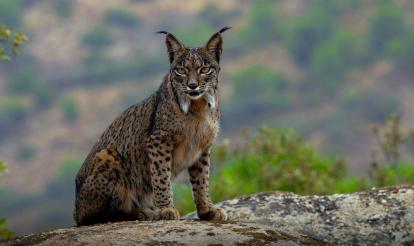
Filming the Iberian lynx is a great adventure and a real privilege. Access to this iconic animal of our fauna, which has been heavily protected for several years, is no easy task, and until now there has been scant material on its routines and behaviour in the wild. A documentary that reveals the life of this enigmatic animal, The Kingdom of the Iberian Lynx, will be premiered on CaixaForum+ with never-before-seen images, on 6 June.
Neither the BBC nor Félix Rodríguez de la Fuente. Documentary filmmaker Nacho Ruiz and producer Vicenç Turmo, together with Pablo Alemán of the Wild Stories production company, have managed to capture the Iberian lynx in images of unprecedented quality and duration. For Nacho Ruiz, the premiere of the series – co-produced by CaixaForum+ and consisting of two 50-minute episodes – is the happy end of a long and arduous project: “Filming the lynx is the dream of every documentary filmmaker, because it’s a very iconic animal that’s very difficult to film and of great interest both in Spain and abroad.”
In this extraordinary production about the life of the lynx, the Wild Stories team's secret weapon was Gabi Llorens, an amateur naturalist who has been observing the animal in its habitat for more than 30 years. Llorens has been instrumental in developing the project as Nacho Ruiz had envisioned it: “When we met Gabi, we knew it was the right time to do it. He gave us the hope that we’d be able to fulfil the expectations of images that I had as a director, because we didn't just want to make a report on the lynx, but rather a to create a rigorous documentary about its life, its behaviour and its conduct.” Llorens' knowledge was therefore key. Above all, because the team wanted to tell the story of the lynx's life without any human intervention; to show its essence as if the cameras were not there.
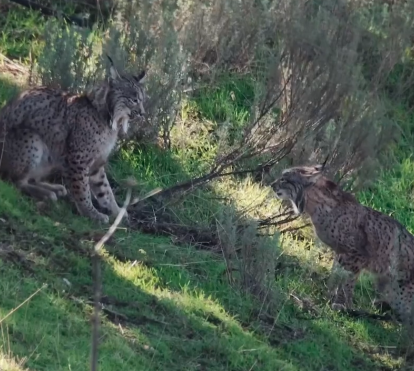
Practically all the footage was shot in the Andújar Natural Park, in the heart of the Jaén mountains. The choice of location was not random, as this area holds great significance for the species: “Andújar is a very special place, not only because of the beauty of the landscapes, which are spectacular, but also because this is where the lynx originated in its habitat. This is where the species was reborn and where all the lynxes that are now repopulating different areas of Spain came from,” explains Ruiz.
Apart from the harshness of the mountain and the weather, the biggest challenge of the filming was the behaviour of the Iberian lynx itself. “The lynx is a unique animal. It always appears when you least expect it, like a ghost that appears out of nowhere,” says naturalist Gabi Llorens. “It has no routine, it's totally unpredictable. We thought we’d get it because we were in the right place with the right people, but there was really no guarantee,” adds Nacho Ruiz.
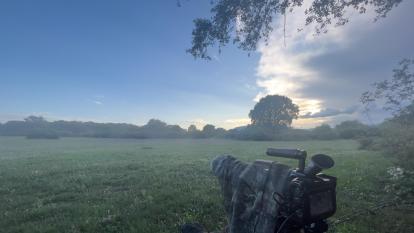

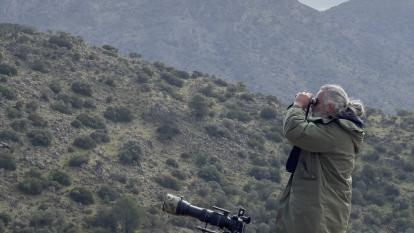
During the two years of filming, the field crew alone comprised ten camera operators and seven naturalists and scouts to cover as much territory as possible. Their aim was to capture spectacular, high-quality images without disturbing the environment. “In a natural park, you can't go into the bush and chase the lynx because, apart from going against the purpose of the documentary itself, it's strictly forbidden. So the choice of places to wait and the distance to keep from the animal were fundamental decisions,” explains Ruiz.
Fortunately, the long days spent sleeping in the field, with patience and fatigue at the limit, paid off. “Every time we shot a sequence with the right quality and at the right distance, the suffering disappeared and turned into infinite joy.” One of those joys, and a great anecdote, was spending the end of the year in the Andújar Natural Park with a lynx sleeping 15 metres from the film crew: “It slept next to us all night. We could see it with the torch and we were able to shoot some scenes. It was a very beautiful night, the most authentic New Year's Eve of my life,” he adds.
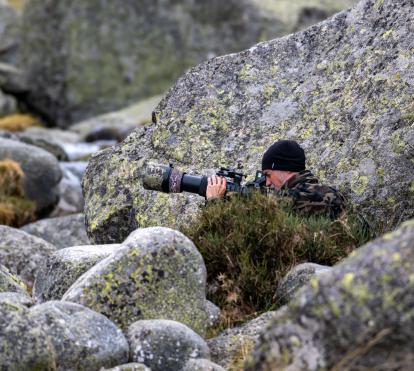
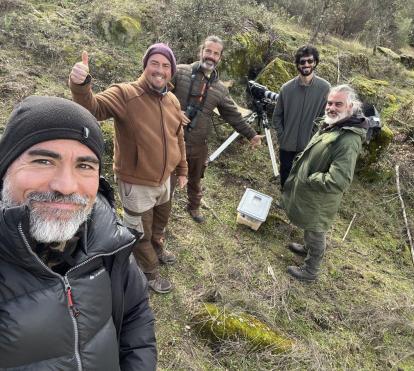
Time does not exist for the Iberian lynx. Its trail as an enigmatic animal is marked by slow and patient movements that turn its presence into a plea to remain, to anchor itself in the territory from which, barely twenty years ago, it almost disappeared. This species, so unknown in general, has been the protagonist of a major conservation project that has attracted international attention and recognition and has managed to reverse the critical situation that threatened its existence. Driven by European LIFE funds, the last 25 years have been the result of exemplary coordination between administrations, as well as the awareness of private landowners and the great efforts of biologists, naturalists and nature lovers, who have managed to remove the lynx from the danger zone. According to the latest report from the Ministry for Ecological Transition and the Demographic Challenge (MITECO), there are currently 2,021 lynxes registered across Spain and Portugal. The population with the highest number of individuals is in Andalusia, followed by those of Castilla-La Mancha, Extremadura and Murcia.
Although the documentary does not include an exhaustive review of data from the recovery project, it does explain the context of the species' situation: “There’s a very positive message regarding conservation efforts; that is, when there’s political and social will to solve a problem, such as the extinction of a species, it can be solved. And this is a very important message in a world where nature is usually talked about in an apocalyptic tone,” says Pablo Alemán. “One of the producers' intentions is also to spread the word worldwide about this achievement that has been accomplished in Spain, and that many countries are attempting with other species.”
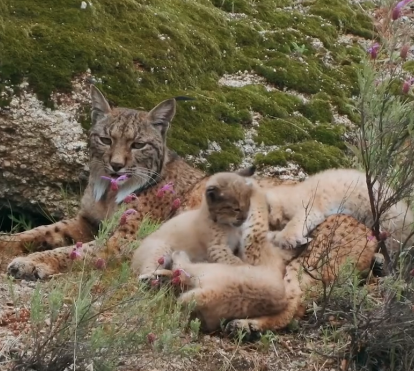
Productions like The Kingdom of the Iberian Lynx represent the commitment of CaixaForum+ to cultural content about nature, a genre which, according to the director and producers of the documentary, needs to be championed: “We want there to be a documentary culture in Spain, for nature documentaries to be produced and for public institutions to help us, among other things because Spain is the country with the greatest biodiversity in Europe and we have an exceptional natural treasure that needs to be showcased.”
Moreover, as Vicenç Turmo adds, this type of cultural content is a good way of raising awareness of the importance of caring for our planet to preserve the natural environment: “We should consider them essential, especially for the new generations, and promote this constant awareness of the planet's natural heritage.”